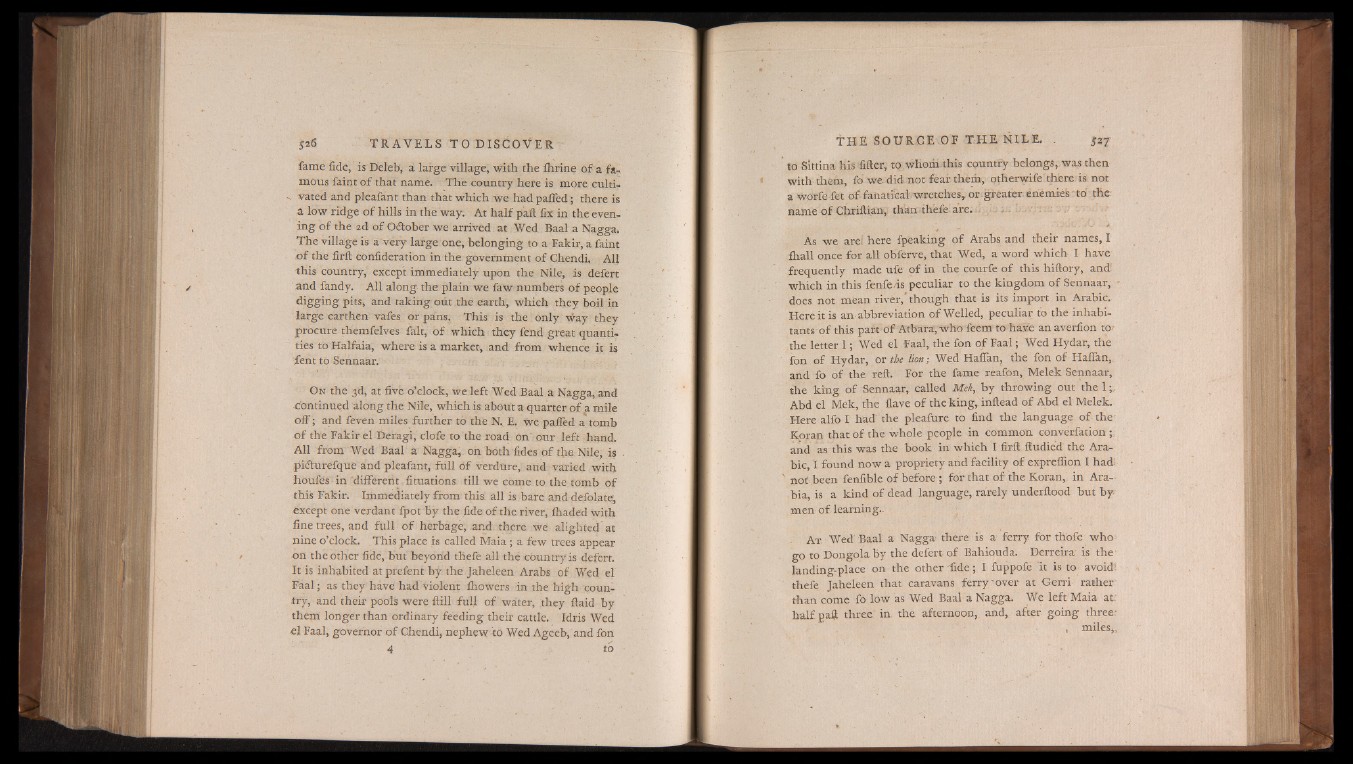
fame fide, is Deleb, a large village, with the ihrine o f a famous
faint o f that name. The country here is more culti-
•v vated and pleafant than that which we had paifed ; there is
a low ridge o f hills in the way. At h a lf paft fix in the evenin
g o f the 2d o f Oétober we arrived at Wed Baal a Nagga,
The v illage is a very large one, belonging to a Fakir, a faint
o f the firft confideration in the government o f Chendi. A ll
this country, except immediately upon the Nile, is defert
and fandy. A ll along the plain we faw numbers o f people
digg ing pits, and taking oiit the earth, which they boil in
large earthen vafes or pans. This is the only way they
procure themfelves fait, o f which they fend great quantities
to Halfaia, where is a market, and from whence it is
fent to Sennaar.
On the 3d, at five o’clock, we left Wed Baal a Nagga, and
■continued along the Nile, which is about a quarter o f a mile
o ff ; and feven miles further to the N, E, we pafifed a tomb
o f the Fakir el Deragi, clofe to the road on' our left hand.
All from Wed Baal a Nagga, on both fides o f the Nile, is
pi&urefque and pleafant, fu ll o f verdure, and varied with
houfes in different fituations till we come to the tomb o f
this Fakir. Immediately from this a ll is bare and defolate,
except one verdant fpot by the fide o f the river, ihaded with
fine trees, and fu ll o f herbage, and there we alighted at
nine o’clock. This place is called Maia ; a few trees appear
on the other fide, but beyond thefe all thé country is defert.
It is inhabited at prefent by the Jaheleen Arabs o f Wed el
Faal; as they have had violent Ihowers in the high country,
and their pools were Hill fu ll o f water, they ftaid by
them longer than ordinary feeding their cattle. Idris Wed
e l Faal, governor o f Chendi, nephew to Wed Ageeb, and fon
to Sittina his fitter, to whom-this country belongs, was then
with them, fo w e did not fear them, otherwife there is not
a wprfe fet o f fanatical wretches, or greater enemieS to the
name o f Chriftian, than thel'e arc. , : &
As we are! here fpeaking o f Arabs and their names, I
fliall once for all obferve, that Wed, a word which I have
frequently made ufe o f in the courfe o f this hiftory, and
which in this fenfe/is peculiar to the kingdom o f Sennaar, •
does not mean river,'though that is its import in Arabic.
Here it is an abbreviation o f Welled, peculiar to the inhabitants
o f this p a r t o f Atbara, Who feem to have an averfion to-
the letter 1; Wed el Faal, the fon o f Faa l; Wed Hydar, the
fon o f Hydar, or the lion-, Wed Haifan, the fon o f Haffan,
and fo o f the reft. For the fame reafon, Melek Sennaar,
the k in g o f Sennaar, called Mek, by throwing out the 1
Abd el Mek, the Have o f the k in g , inftead o f Abd el Melek.
Here alfo I had the pleafure to find the language o f the-
Koran that o f the whole people in common converfation
and as this was the book in which I firft ftudied the Arabic,
I found now a propriety and facility o f exprelfion I had:
' not been fenfible o f b e fo re ; for that o f the Koran, in Arabia,
is a kind o f dead language, rarely underftood but by
men o f learning..
A t , Wed Baal a Nagga- there is a ferry for tftofe who-
go to Don golab y the defert o f Bahiouda. Derreira is the
landing-place on the other E d e ; I fuppofe 'it is to avoid!
thefe Jaheleen that caravans fe r ry 'o v e r at Gerri rather
than come fo low as Wed Baal a Nagga, We left Maia a t
h a lf paft three in the afternoon,, and, after going three.-
, miles,,